A Low Level of ADH Can Cause kidneys to Excrete More
ADH or the anti-diuretic hormone or vasopressin is a naturally occurring hormone that regulates various bodily functions.
From maintaining osmotic balance to regulating blood pressure, all healthy functions in our body correlate with the working of ADH.
The vasopressin hormone is important for your body both at noon and at night. But the question in light is why ADH is important at night.
Similar to this, there could be many such problems that low ADH can elicit in your body. It is because of this reason people often look for different ways how to increase ADH at night.
This blog reveals all about the role of vasopressin and what happens if its levels are low along with how to increase ADH hormone naturally.
But before we start with the ADH decline, we first must understand every role of the vasopressin hormone in our body.
In case you’re running short of time, go through this short video to know how to increase adh at night naturally.
What is Anti-Diuretic Hormone or The Vasopressin?
Our body is a complete system of cells, tissues, and organs that are run by a set of glands. These glands secrete different types of hormones targeting different organs, for stimulating natural and healthy functions of the body.
According to science, the hormone has a pivotal role in the circulatory and excretory functioning of the body.
Their actions are regulated by their release from the hypothalamus and storage in the pituitary from where they are secreted to regulate functions like:
#1. Maintaining the Osmotic Balance of the Body
This checks the amount of salt and water present in our bodies to prevent any imbalance in electrolytes.
When there is an excess concentration of salt in the body as compared to water, the ADH is released to reabsorb water through the tubules in the kidney.
This helps restore healthy levels of both salt and water to keep the body in its hydrated state.
#2. Regulates the Blood Pressure
It controls the excretion and reabsorption of water to keep the blood pressure within a healthy range.
When the different receptors in the body sense a decrease in blood pressure and blood volume, ADH is released.
The hormone then regulates water balance and constricts the blood vessels to restore normal blood parameters.
#3. Kidney Functioning
The ADH maintains a regular functioning of the kidney to ensure regular flushing out of excess water and keeping in the required nutrients. It affects the distal tubules of the kidney to reduce the excretion of water.
Hence, ADH is only released from the pituitary when:
- Changes in the osmolarity or the volume of blood in the body
- Imbalance in the amount of water and salt
But what if the ADH is not released? Since it governs major functions like blood pressure and osmolarity it could interfere with your daily life in the following ways.
What Happens If ADH Levels are Low?
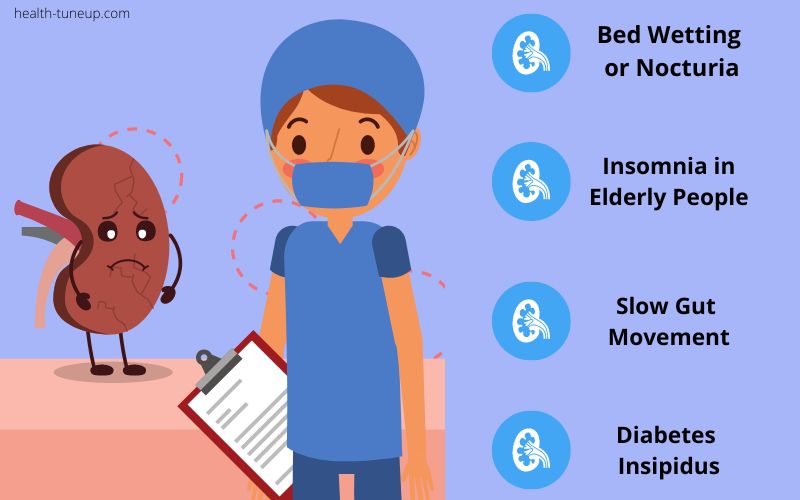
The two most common reasons why ADH can be low in your body are:
- because the hypothalamus isn’t producing enough of it
- the pituitary is releasing small amounts of ADH.
In both cases, there is increased excretion of water resulting in different complications.
However, the most common interference of ADH we see in daily life is bed wetting.
#1. Bed Wetting or Nocturia
Nocturia is characterized by an increase in the frequency of urination at night, which generally is due to underlying bladder and prostate disorders in old age.
But recent reports suggest that an increase in the amount of urine production is becoming a major cause of nocturia.Since urine production is regulated by the release of anti-diuretic hormones, its role has come out to be the highlight of the condition.
In a healthy person, there is a general increase in the release of ADH at night which minimizes the amount of urine produced and hence reduces waking up in the middle of the night.
One such study was conducted on twelve aged patients with severe nocturia. They were assessed for 24 hours for changes in the ADH release and urine production. For this blood levels in ADH and changes in urine output were analyzed in patients with oral administration of desmopressin.
Compared to normal healthy patients, it was found that there was no diurnal variation in urine output and increased nocturnal urine production. These are associated with the secretion of low ADH levels at night.
Scientific reasoning for this comes from health experts who suggest, that a gradual decline in ADH at night is to match the amounts of ADH released during the day. This causes a difference in the release giving way to nocturia.
Since nocturia increases the frequency of awakening during the night it can also affect the sleep patterns among the elderly.
#2. Insomnia in Elderly People
The most common sleep disruptions at night are influenced by hormones. One such hormone is the anti-diuretic hormone.
The reason why people want to know ways how to increase ADH at night is to prevent frequent urination and not disrupt their sleep cycle.
But with the decrease in anti-diuretic hormones, there isn’t any check on the fluid process and a large amount of fluid reaches the bladder.
Since the bladder cannot control that much urine, its receptors send signals to the brain to alert an urge to pee. It ends up waking you up multiple times in the night.
Persistent decrease in the ADH levels, causes your sleep cycle to change, resulting in insomnia which is characterized by the inability to fall asleep or maintain long hours of sleep.
But it’s not just urination, that comes under the influence of fluctuating anti-diuretic hormones.
The hormone can also have a deep impact on your bowel movements interfering with its motility and resulting in constipation and painful movements.
#3. Slow Gut Movement
In a healthy body, normal ADH levels have two effects on the intestine:
- It increases the secretion of water and salt into the lumen by reducing the amount of salt absorbed through the intestinal walls.
- Controls the sodium pump to regulate the exchange of salt and water through the walls of the intestine as it only allows the unidirectional flow of salt.
This enhances the absorption of the intestinal walls and hence there is normal gut motility.
As published in Neurogastroenterology and Mobility, the study used two plastic balloons made of condoms inserted in the stomach and duodenum to check for pressure changes among rabbits after injecting vasopressin.
Systemic administration of Vasopressin was done and changes were noted which concluded that it showed an increase in gastrointestinal motility.
Hence, looking at the results and the mechanism of ADH, its decrease in the body can lead to slower motility of the gut.
Although these cases of decreased ADH are severe enough to create interference with your daily life, there is one major complication of the condition.
Related: Biotics 8: Men’s Probiotics for Gut Health
Low ADH levels can give rise to a serious health condition – Diabetes Insipidus among people.
#4. Diabetes Insipidus
This type of diabetes is different from sugar diabetes i.e. diabetes mellitus.
Diabetes insipidus is a significant health complication of a decline in ADH levels.
Lowering ADH levels causes the collecting tubules of the kidney to become impermeable to water resulting in excess urination.
The excess release of water causes concentrative accumulation of electrolytes in the body that result in:
- Increase in sodium accumulation
- Hypersomolarity or highly concentrated body fluids
This creates a state of dehydration in the body that signals the brain to increase water intake resulting in symptoms like:
- Polydipsia – Characterized by an increase in the uptake of water or a constant thirst
- Polyuria – The more water you take, the more urine is produced, and hence there is an increase in the frequency of urination throughout the day.
However, there can be two types of Diabetes Insipidus based on the underlying cause:
- Central Diabetes Insipidus is caused by reduced release or production of vasopressin
- Nephrogenic Diabetes Insipidus is resistant to ADH because of the resistance of the receptors of ADH (V receptors).
Central Diabetes Inspidus similar to the other health complications caused by ADH can be reversed by increasing the levels of ADH in your body.
Out of all the causes, nighttime urination is among the most commonly faced misery of low ADH levels.
Antidiuretic Hormone and Frequent Urination at Night
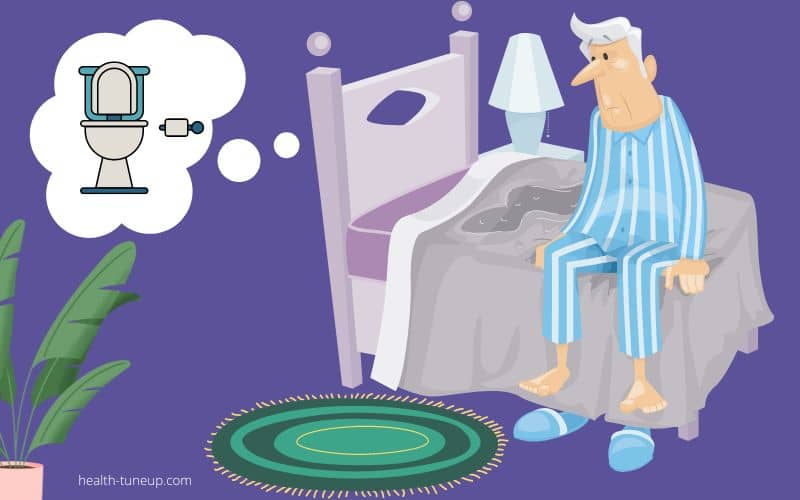
The increased urine production at night is how you can simply define nocturia. It is >22% of 24-hour urine volume in young adults and >33% in older adults.
Nocturia affects nearly 40% of the adult population. Its prevalence increases with age. As a result, nearly 70% of people who are aged 70 years or above are affected by it. Whereas, in the case of younger adults (20-30 years of age) it is around 30%.
In general, an increase in ADH during sleep results in less concentrated urine. Elderly people who often feel the urge to urinate at night have shown low levels of ADH at night.
As per West Suffolk NHS Foundation Trust, taking desmopressin 1 hour before bedtime can show a significant decline in urine production overnight.
Evidence
A study investigated the safety and efficacy of the lowest oral dosage of desmopressin in elderly people in treating nocturia.
For this, 60 older men from the urology clinic of Imam Reza Hospital in Tehran, Iran from 2008-2009 were analyzed. They were included in a double-blind placebo-controlled study.
Further, the patients were divided into two groups of 30 each. While group A received a placebo, group B received 0.1 mg of desmopressin at bedtime for 8 weeks. Patients were then assessed after 4-8 weeks of treatment.
No. of voids | After 4 WEEKS | After 8 Weeks |
Less than 2 voids per night | 17 patients | 24 patients |
2 voids per night | 5 patients | 4 patients |
| More than 2 voids per night | 8 patients | 2 patients |
Clearly, oral administration of desmopressin was effective in treating nocturia in elderly men. Desmopressin surely answers how to increase ADH at night.
Although it could be done by hormonal therapies, there are also natural ways to increase vasopressin in your body.
How to Increase ADH/Vasopressin Naturally? [TOP 3 Ways]
Vasopressin can be naturally increased in many ways. However, there are other answers to how to increase ADH at night i.e. dietary and lifestyle modifications.
The TOP 3 most common and effective ways of restoring your declining ADH are:
#1. Foods that Increase ADH Levels
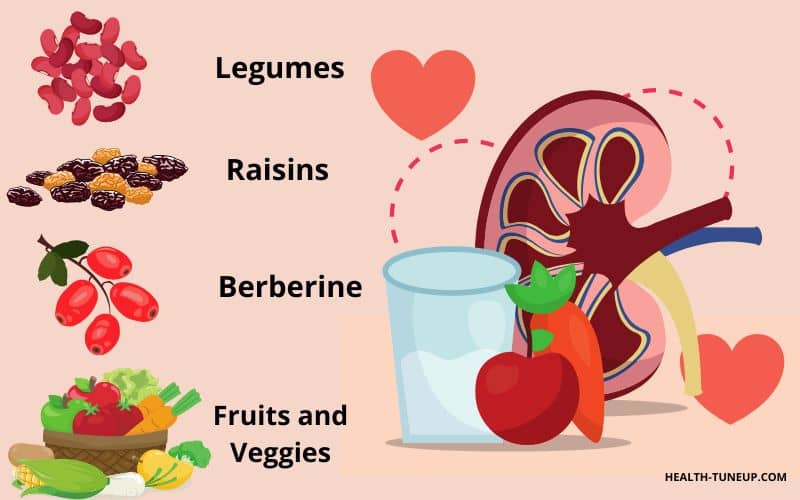
If you don’t have enough knowledge about how to increase ADH at night, start with foods that increase ADH levels.
So, what foods increase ADH hormone?
Since Anti-diuretic hormone is synthesized in the body, you can stimulate its production by adding certain foods to your daily diet.
Here are some of the best foods that increase ADH levels:
1. Legumes
vasopressin is synthesized by our body with the help of glycine an amino acid found actively in legumes. some other plant-based foods that you can derive glycine from include peas and beans. Though some natural glycine supplements increase ADH, they aren’t safe for pregnant and lactating women, hence they should stick to natural diets.
2. Fruits and Vegetables
The presence of polyphenols in fruits can increase the production of ADH levels and elucidate the mechanism.
Also when it comes to vegetables, bitter gourd and carrots can effectively contribute to increasing the ADH levels.
3. Raisins
Though there isn’t any research or pieces of evidence that suggest the role of raisins in improving ADH levels some people do find it helpful in controlling nocturia.
Other than foods there are also herbal extracts that are effective in increasing ADH.
4. Berberine
Similar to Rhodiola it too inhibits certain enzymes that can cause depletion of the hormone, and hence actively level up the hormonal balance.
5. Forskolin Root Extract
Forskolin a traditional medicinal plant is known to have a positive impact on ADH release. There are Forskolin root extract supplements available that can help you boost ADH production. But before you consume supplements that increase ADH it’s recommended to consult a doctor.
Other than foods, another popular way how to increase ADH at night naturally is by exercise.
#2. Exercises to Increase ADH Level
According to a study, adding high-intensity exercises to your daily workouts can be an effective way of boosting your ADH levels naturally.
It followed a cross-over design and had 10 participants who exercised daily for 40 minutes. Other participants stopped exercising after 30, 24, 20, 12, 10, and 8.5 min.
According to the observations in the study, it was found that high-intensity workouts raised ADH levels significantly along with glucose.
However, there wasn’t any association between the two. But that highly suggests adding high-intensity exercises to your daily workout routine.
You can even follow the below high-intensity workout program comprising of:
Burpee Interval Workout
4 circuits with 1 minute of resting time after burpees in each round.
- 30 seconds of pullups
- Jumping jacks with at least 60 reps
- 20 reps of burpees
Jump rope interval workout
Try to complete 4 circuits with a resting time of 1 minute after jumping rope as you go through your rounds.
- Mountain climbs of 45 reps
- Pushups 20 to 30 reps
- Front plank of 1 minute
Resistance Band Finisher
complete 4 circuits of the following plan with 1 minute resting time after each curl.
- Jump rose of 1 minute
- 12 – 15 reps of dips
- 30 high knees with each knee
- 30 reps of curls with high knees
Exercise is yet another productive answer to how to increase ADH at night. These workouts can be the best ways to increase vasopressin naturally in males and females of young age.
But for elder people, these workouts aren’t possible, yet what’s possible is doing moderate-intensity workouts and following some rules in your daily lifestyle.
Although these changes won’t boost your ADH levels they are going to control your insomnia and nocturia.
There are many answers to how to stop peeing at night naturally, and one of them is lifestyle changes.
#3. Lifestyle Changes For Improving ADH At Night
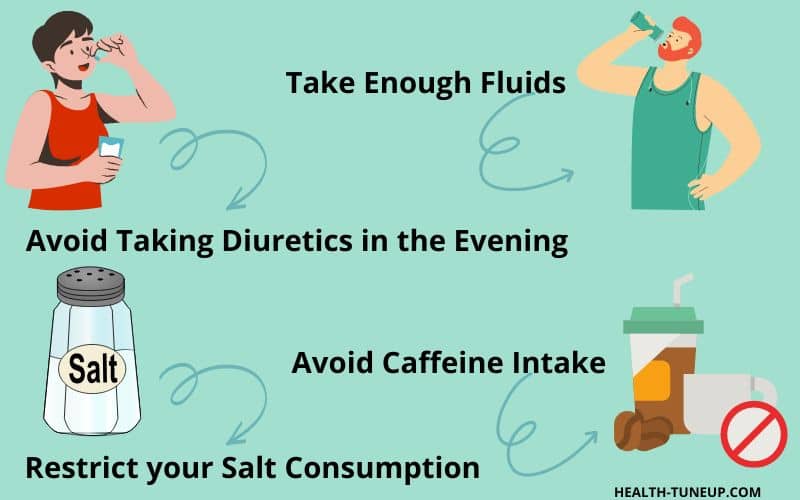
The answer to how to increase antidiuretic hormone naturally finally ends with making a few changes in your daily life.
#1. Avoid Caffeine and Alcohol
Consuming too much caffeine and alcohol can be one of the major causes of increased urination during the night and decreased ADH release. Alcohol can also be a substance irritational for the bladder along with stimulating your body to enter the dehydrated stage.
#2. Restricting Salt Intake
Too much salt intake in the body can increase the amount of urine formation and hence increase nocturia. Studies also show that restricting your salt consumption can lower the effect of decreased ADH.
#3. Late Afternoon Dehydration
Drink enough fluids throughout the day, but switch to fewer fluids as the evening approaches. This is going to reduce the amount of fluid processed through your kidneys and hence prevent nocturia.
#4. Medications
Avoid taking diuretics in the evening or a few hours before going to bed as they increase urination and hence can cause problems during your sleep with frequent urination.
As per the study reports, testosterone, and DHT enhance the accumulation of AVP mRNA (arginine vasopressin) in the SON (supraoptic nucleus) of male rats receiving a chronic hyperosmotic challenge.
Therefore, you can try including testosterone boosters but only after consulting your healthcare provider.
Moving on, men’s bodies naturally start to produce less testosterone after the age of 30. Testoprime is one of the safest natural testosterone boosters for men in their 30s and 40s. It revitalizes the body and reverses the symptoms of low T by flooding the body with testosterone. To learn more about this testosterone booster you can visit Testoprime official website.
These were some of the natural ways how to increase ADH at night. From making healthier dietary modifications to making changes in lifestyle, natural ways to increase vasopressin can be helpful.
The queries related to ADH levels have not ended yet and therefore we have come up with a list of the most frequently asked questions about ADH.
FAQS
Take a look at the most commonly asked queries about anti-diuretic hormone/vasopressin and how to increase its levels.
#1. Is peeing 3 times at night normal?
No, peeing 3 times at night is normal if this happens to you every day. It is a clear sign of an imbalance in ADH level.
#2. What is a normal ADH level?
The normal value of anti-diuretic hormone ranges from 0 to 5.9 pg/mL (0 to 5.4 pmol/L).
#3. What vitamin helps with bladder control?
Vitamin C and D are clinically proven to have positive effects on bladder control. Apart from this, you can also include minerals such as magnesium and calcium.
#4. Does deep sleep increase ADH?
ADH increases during sleep. However, no research or scientific proof specifically shows that ‘deep sleep” increases ADH.
#5. Can lemon stop frequent urination?
Lemon is a natural diuretic therefore it may increase in the frequency of urination. Though it does contain vitamin C, its nature as a diuretic may be overpowering.
#6. Can bananas stop frequent urination?
Bananas are high in fiber and can have a positive effect on bladder health overall.
#7. What is the fastest way to relieve frequent urination?
Doing natural home remedies like performing pelvic floor exercises like kegel exercises, stopping drinking too much water just before going to bed, and improving sleep quality.
#8. Can B12 deficiency cause frequent urination?
Yes, vitamin B12 deficiency can cause frequent urination and therefore you must go for a vitamin test if you have symptoms of low ADH.
#9. Can low vitamin D cause frequent urination?
Yes, vitamin D deficiency can increase the risk of overactive bladder and frequent urination at night.
#10. What symptoms are created by a lack of ADH?
Apart from frequent urination, excessive thirst is also one of the common symptoms of low ADH levels.
An imbalance in ADH levels can be irritating and can affect your entire lifestyle.
So, just in case you don’t like waking up multiple times during the night just to relieve yourself, consider the above-mentioned food, exercise, supplements, and lifestyle changes if you don’t know how to increase ADH at night.
Wrap-UP
The anti-diuretic hormone is a key water and electrolytes balance regulator that can influence different, metabolic processes.
Because of its actions on the water absorption and excretion of different electrolytes, it can affect homeostasis and blood pressure.
But along with that, it can also control your urination and even your gut movements through different pathways.
Owing to its decrease with growing age, it has been commonly associated with nocturia or night urination. Hence, it’s important to check on the ADH levels for healthy functioning of the body.
If the frequent urge to urinate at night has been keeping you awake, try these natural ways to improve nocturia. Also, don’t forget to share your experience.
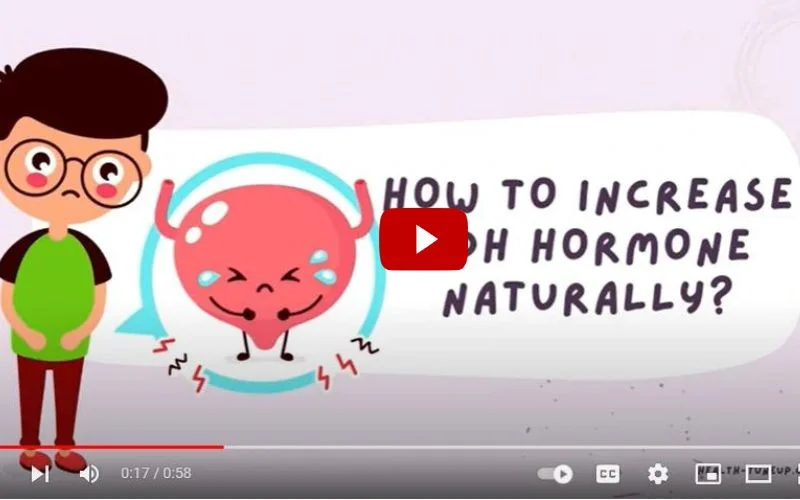
Three years ago, I woke up after a heavy night. I was absolutely exhausted even though I had 10 hours of sleep & had to go back to bed where I stayed for the next 18 hours.
Before this I was fit & healthy & ran everyday for 2 miles.
Since that time, I spend most of my life in bed too fatigued to live normally. I am constantly thirsty but water just goes straight through me.
I have balance difficulties, brain fog, feel like fainting & feel unwell. I have been tested for diabetes 1 & 2 with negative results.
Living in the UK I find it impossible to see a GP.
Could this be diabetes insipidus?
Hello Jon,
Hope you’re doing well.
Talking about what you’re going through, the symptoms of diabetes and diabetes insipidus can vary in terms of severity from person to person. Considering you’re already diagnosed with diabetes, whether it is diabetes insipidus can only be confirmed after tests. You must talk about it with your doctor to get properly diagnosed and go for a water deprivation test, MRI, and genetic screening to find out if it’s diabetes insipidus or not. Take care!